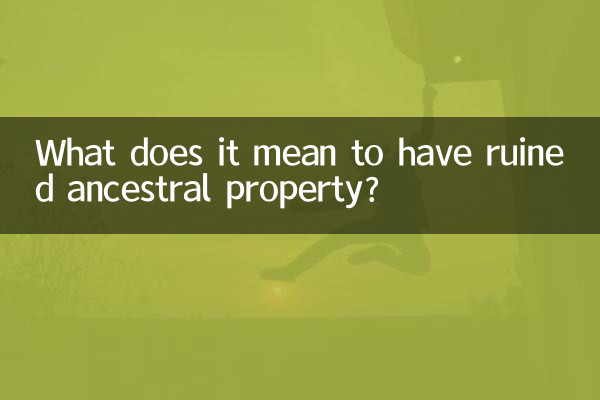What does it mean to have ruined ancestral property?
In recent years, the term "ancestral ruins" has frequently appeared in online discussions, especially in topics such as traditional culture, the rise and fall of families, and social economy. This article will combine the hot topics and hot content on the Internet in the past 10 days to analyze the meaning of "the ruin of the ancestral property" and explore the social phenomenon and cultural significance behind it.
1. What is the ruin of ancestral property?

"The ruin of ancestral property" usually refers to the gradual decline or loss of the industry, wealth or social status accumulated by a family or family for generations due to various reasons. This phenomenon may be caused by various factors such as economic crisis, internal conflicts within the family, social changes or poor management of future generations. In traditional culture, ancestral property often carries the family's honor and expectations, and its dilapidation is often seen as a symbol of family decline.
2. The relationship between hot topics in the past 10 days and the ruin of the ancestral business
The following are hot topics and hot content related to "the ruin of the ancestral property" in the past 10 days:
| topic | Related content | heat index |
|---|---|---|
| Family business inheritance issues | Many family businesses in many places have operational difficulties due to poor second-generation succession. | ★★★★☆ |
| protection of traditional culture | Ancient architecture and intangible cultural heritage skills are facing loss due to lack of funds | ★★★☆☆ |
| Downward pressure on the economy | Wave of bankruptcies of small and medium-sized enterprises raises concerns about family businesses | ★★★★★ |
| The film and television drama "Family Glory" is popular | The plot of the family's rise and fall in the play resonated with the audience | ★★★☆☆ |
3. Common reasons for the ruin of ancestral businesses
According to recent hot topics and case analysis, the main reasons for the ruin of ancestral businesses include:
| Reason type | Specific performance | Typical cases |
|---|---|---|
| changes in economic environment | Industry recession, policy adjustments, and intensified market competition | A traditional manufacturing family in a certain place went bankrupt due to failed industrial upgrading. |
| Conflict within the family | Inheritance disputes and management concept conflicts | A well-known catering brand split due to family infighting |
| Insufficient ability of offspring | Lack of business experience or innovative awareness | A century-old brand went bankrupt due to poor management by the younger generation |
| social and cultural changes | Lost traditional skills and intergenerational differences in values | Intangible inheritance heirs have no successors |
4. How to avoid the ruin of ancestral property?
Based on recent expert opinions and successful cases, the following suggestions are available for reference:
1.Strengthen family education: Pay attention to the cultivation of future generations and combine family culture with modern management knowledge.
2.Establish a scientific inheritance mechanism: Reduce inheritance risks through family trusts, professional managers, etc.
3.Maintain a sense of innovation: Timely adjust business strategies according to market changes and avoid sticking to tradition.
4.Pay attention to cultural inheritance: Activate traditional assets through digitalization, branding and other means.
5. Society’s reflection on the ruin of ancestral property
In recent online discussions, many people believe that the ruin of ancestral properties is not only an economic problem, but also a challenge to cultural inheritance. In an era of rapid change, how to balance tradition and innovation, family and modern management has become a proposition worth pondering. Some scholars have proposed that a more complete social support system should be established to help traditional family industries transform.
(The full text is about 1,000 words)

check the details

check the details